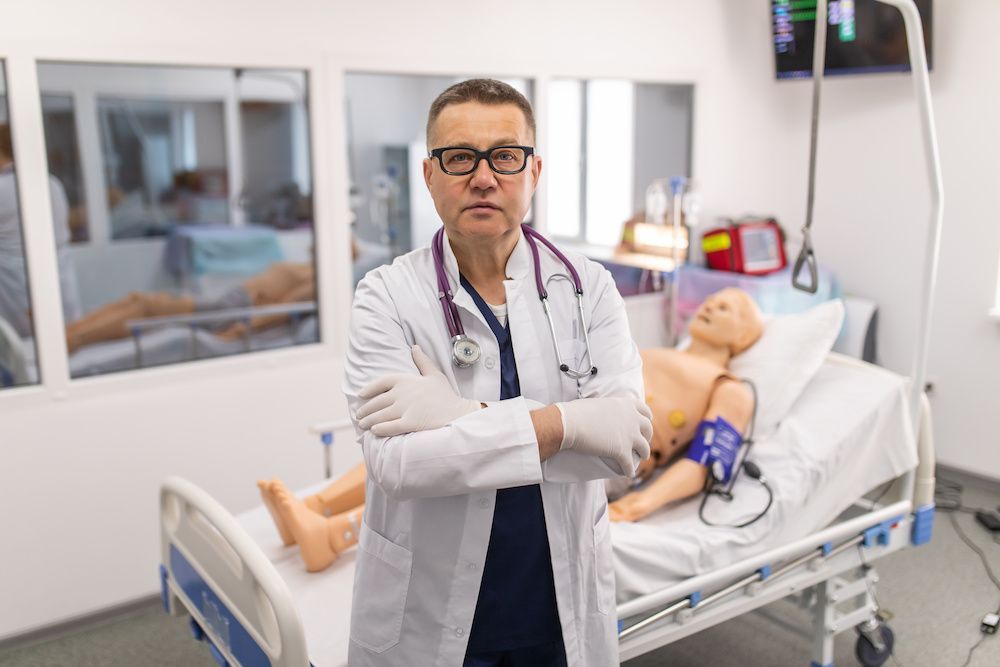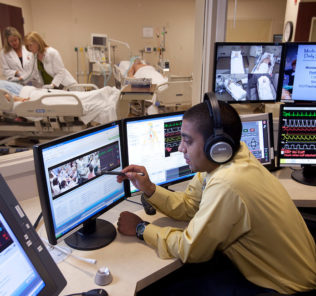How to Become a Healthcare Simulation Educator
A Healthcare Simulation Educator is part of a team whose goal is to develop and implement simulation-based education and training designed to enhance patient safety and quality during healthcare delivery. These professionals are responsible for the coordination of a number of key simulation programs delivered by an educational center including the development of educational programs, teaching, coordination and administrative tasks. Depending on the particular facility, the Simulation Educator may also assist with clinical session preparation and break-down, the operation of simulators and by taking the role of faculty actor in immersive simulation training sessions.
This HealthySimulation.com article interviews with Dr. Kim Baily, PhD, RN, CNE, retired clinical simulation expert, on how to become a healthcare simulation educator.
“Most Healthcare Simulation Educators have an extensive clinical background and some experience as a healthcare education”, Dr. Kim Baily PhD, RN, CNE, a Sim Educator in the Los Angeles area, said. “Once they start to gain experience in teaching simulation, they can become involved in simulation program development and operation.”
Sponsored Content:
Education & Training
Healthcare Simulation Educator may have earned at minimum a Bachelor’s of Nursing degree, but typically have Advanced healthcare degrees in Nursing (MSN), Medicine (MD), Education (PhD) or similar. The underlying academic degree depends to some extent on the requirements of the institution where the simulation takes place. Some degrees can be in education, healthcare or a related field.
View the HealthySimulation.com LEARN CE/CME Platform Webinar Introducing INACSL’s New Simulation Standard: Professional Developmentto learn more!
A Certified Healthcare Simulation Educator (CHSE) certification is also preferred. This role requires that a professional have prior experience in a student-centric and hands-on learning environment, as well as having three years of clinical experience. Depending on the state in which a professional is seeking employment, a license may also be required. Most Simulation Educators work in academic departments or hospital education departments. “The standards for simulation education vary tremendously from one institution to the next,” Baily explained. “At one simulation lab, an educator may be expected to have studied the medical simulation on their own, while in more formal institutions certification and proof of experience may be required. Attending workshops and gaining certification in simulation builds a strong resume.” She added that, while few institutions offer master’s degrees in simulation, there is no set pathway to become a Simulation Educator. Certainly, formal training and certification in simulation adds to a professional’s credentials.
Sponsored Content:
Career Advancement
“Gaining certification is looked at as a key element in being a Simulation Educator,” Dr. Baily noted. “Working for a nationally accredited facility can lead to more opportunities including paid continuing education.” Professionals can also advance in a career as a Healthcare Simulation Education by obtaining a specialized simulation degree, such as a Master’s Degree in Medical Simulation, or by gaining increased instructional experience (with a focus on simulation). Additionally, advancement opportunities may arise through the participation in relevant research for scholarly activities in simulation-based education.
Experience & Skills
As a Healthcare Simulation Educator, these professionals should be competent in using technology, including multiple computer platforms, software applications and audio/visual methods for recording and editing. Furthermore, they should possess strong communication, interpersonal, analytical and organizational skills. Also, some employers seek Healthcare Simulation Educators who have experience with the development of simulation scenarios, operation of 3-G manikins and who are able to move equipment and learning materials up to 30 lbs. “Healthcare Educators should be able to run scenarios and debrief students using their clinical experience. In other words they should be content experts,” Baily stressed. “They should follow scenario objectives and the facility standards as well as conduct debriefing sessions with student learning in mind.”
Personality & Communication
“CHSE’s should like working with people, and be able to think about student education and what the students need to be successful,” Kim said. They should not be focused on what they can find students doing wrong, but rather allow students to reflect back on what they did and what they might need to change. Students must define and either accept or reject their own frames of reference and make changes in their thinking. There is no room for the ‘sage on the stage’ kind of teaching in simulation.” Thus, overall, ideal Simulation Facilitator / Debriefers are those who possess a desire to help improve healthcare and positively affect patient safety. These professionals should enjoy both guiding and educating students and other professionals, as well as providing leadership across an institution or facility. “This career has nothing to do with the educator, and everything to do with aiding the learner,” Baily explained.
Lifestyle & Opportunities
Healthcare Simulation Educators may work full or part-time. Sim educators usually work in an academic or hospital setting. Hours of simulation operation vary tremendously depending on the facility. For Baily, who is employed at a community college, her simulation sessions run weekdays from 8 am to 2 pm with setup and tear down before and after each sim day. Administration duties, scenario writing, collating data etc. are in addition to the actual sim sessions. Smaller institutions often do not have money for full time Simulation Educators. There may be no Healthcare Simulation Administrator or Healthcare Simulation Technology Specialist and therefore the Simulation Educator will be responsible for all the set up and maintenance of equipment. “The majority of simulation labs run on a schedule,” she explained. “Some, like those in hospitals, are more likely to run scenarios at off-peak times, such as nights for weekends. Others might run for 8 to 10 hours with multiple groups of learners running through sim.”
Employment & Demand
“Careers in Healthcare Simulation are definitely growing, as is the demand of Healthcare Simulation Educators,” Baily said. “There is a shortage of experienced Simulation Educators. Simulation is growing and so is the need for faculty.” Most often, Healthcare Simulation Educators are hired by higher education settings such as colleges or universities. This is because post-secondary education institutions rely on these professionals, along with Health Educators, to offer their students guidance in educational activities relating to simulation programs. Hospitals also tend to employ Simulation Educators, but at a lesser rate.
Earnings & Compensation
Depending on a professional’s employer and their level of experience, the salary of a Healthcare Simulation Educator typically ranges from $50,000 to $80,000 per year. In larger institutions they can earn more however, in other places some faculty are paid a per Diem faculty rate without benefits”. “You can earn reasonable money,” Baily expressed. “In community colleges, Educators are considered regular faculty and paid $80,000 to $100,000 per year. In larger institutions they can earn more, or some faculty are paid a per Diem faculty rate.”
Additional Resources
- Check out the complete list of healthcare simulation books.
- HealthySimulation.com is the largest independent resource of healthcare simulation news and information.
- See the complete list of non-profit organizations which are media partners with HealthySimulation.com that offer helpful resources like INACSL, SimGHOSTS, IPSS, SESAM, and many more!
Getting Started & Final Thoughts
If already employed by a hospital, find out how to get on a simulation committee. Let administrators know about your interest in simulation (academic or clinical). Attend simulation conferences and take an online course in debriefing.
Additional Questions to Dr. Baily:
- What is the single biggest suggestion you would give to someone wanting to get into this career? Try to find a college or hospital that has a good sim budget. They are more likely to have money for continuing education and sim tech support.
- What’s the number one mistake people make when trying to get into this career? Nurses with extensive clinical experience might think that simulation will be easy, however, a simulation educator is a different role and requires a different skill set. They will need to focus more on educational methodologies including debriefing.
- What is the question people should ask about this career but rarely do? Does the sim facility support faculty development, follow national standards and have a sim tech?
- What are some additional titles for this role? Clinical Simulation Coordinator, Healthcare Simulation Instructor, Healthcare Simulation Faculty, Clinical Faculty, Nursing Simulation Educator, EMS Simulation Educator, etc
Visit the HealthySimulation.com Jobs Page for More Career Advice!
Lance Baily, BA, EMT-B, is the Founder / CEO of HealthySimulation.com, which he started in 2010 while serving as the Director of the Nevada System of Higher Education’s Clinical Simulation Center of Las Vegas. Lance also founded SimGHOSTS.org, the world’s only non-profit organization dedicated to supporting professionals operating healthcare simulation technologies. His co-edited Book: “Comprehensive Healthcare Simulation: Operations, Technology, and Innovative Practice” is cited as a key source for professional certification in the industry. Lance’s background also includes serving as a Simulation Technology Specialist for the LA Community College District, EMS fire fighting, Hollywood movie production, rescue diving, and global travel. He and his wife live with their two brilliant daughters and one crazy dachshund in Las Vegas, Nevada.
Sponsored Content:






















